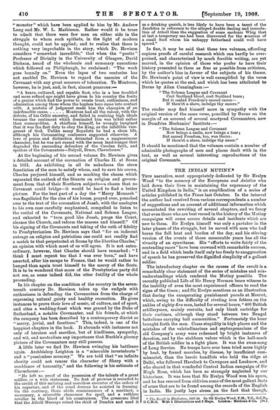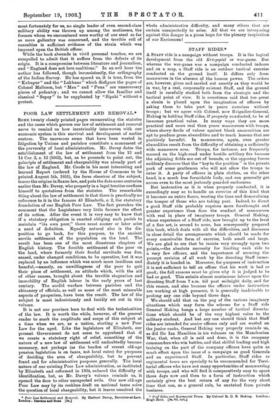THE INDIAN MUTINY.*
Tins narrative, most appropriately dedicated by Sir Evelyn Wood "to the memory of the Europeans and Asiatics who laid down their lives in maintaining the supremacy of the United Kingdom in India," is an amplification of a series of articles published in the Times last October. In the interval the author had received from various correspondents a number of suggestions and an amount of additional information which necessitated the rewriting of several chapters, and we fancy that even those who are best versed in the history of the Mutiny campaigns will come across details and incidents which are new to them. Sir Evelyn himself was only a partaker in the later phases of the struggle, but he served with men who had' borne the full heat and burden of the day, and his stirring- version of the events of those memorable years has all the vivacity of an eyewitness. His "efforts to write fairly of the contending races " have been crowned with remarkable success, and in a field which lends itself only too freely to exaggeration of speech he has preserved the dignified simplicity of a gallant soldier.
The introductory chapter on the causes of the revolt is a remarkably clear statement of the series of mistakes and mis-, understandings which rendered the Mutiny possible. The recently published Life of Sir Henry Norman bears witness to the inability of even the most experienced officers to read the- signs of the times ; and Sir Evelyn mentions as an illustration. that during the exasperating punishment parade at Meerut,. which, owing to the difficulty of riveting iron fetters on the ankles of eighty-five men, lasted for several hours, "400 British artillerymen, mainly recruits, had only blank cartridge for- their carbines, although they stood between two Bengal battalions carrying ball ammunition." Fortunately the hour brought forth the men. Crass stupidity in high places and the mistakes of the valetudinarians and septuagenarians of the old Company's army were redeemed by bright instances of devotion, and by the stubborn valour which is the hall-mark of the British soldier in a tight place. It was the swan-song of Long Service. No troops have ever been tried more highly by heat, by forced marches, by disease, by insufficient com- missariat, than the heroic handfuls who held the ridge at Delhi, who followed Havelock to Cawnpore and Lucknow, and who shared in that wonderful Central Indian campaign of Sir Hugh Rose, which has been so strangely neglected by our historians. It was here that Sir Evelyn Wood won his spurs, and he has rescued from oblivion some of the most gallant feats of arms that are to be found among the records of the English in India. He justly lays stress on the fact that though, * The Revolt in Hindustan, 1857-59. By Sir Evelyn Wood, P.M., "P.C., G.C.M.G. With 8 Illustrations and 5 Maps. Londoa ; Methuen & Co. DLL
most fortunately for us, no single leader of even second-class military ability was thrown up among the mutineers, the foemen whom we encountered were worthy of our steel so far as mere gallantry was concerned, and the terrible roll of casualties is sufficient evidence of the strain which was imposed upon the British officer.
While the book abounds in vivid personal touches, we are compelled to admit that it suffers from the defects of its origin. It is a compromise between literature and journalism, and "England does not love coalitions." In an evil hour the author has followed, though inconsistently, the orthography of the Indian Survey. He has spared us, it is true, from the " Sahnpur" and the "Lakhnao " which disfigure the pages of Colonel Malleson, but " Mau " and "Puna" are unnecessary pieces of pedantry ; and we cannot allow the familiar and classical " Sepoy" to be supplanted by " Sipahi " without a protest.











































 Previous page
Previous page